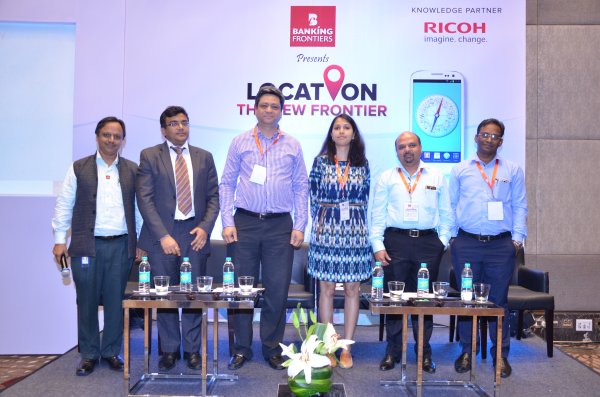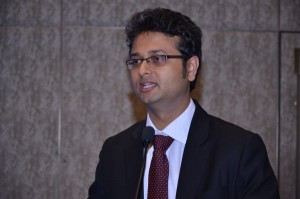Banking Frontiers organized an unconference to discuss on the growing importance of Location. Location-based information can be used by organizations in acquiring customers and proofing customers against frauds:

By knowing a customer’s location, a bank can secure his transactions too. For example, if a customer’s phone is triangulated to a location in Bandra, there is no way he can initiate a transaction in Poland. Therefore, geo-technology has applications in financial transactions too. Geo-location is therefore at the fore-front of creating a marketing and risk-proof fence around a customer.
Some 35 professionals from customer service, marketing and risk domaints participated in a discussion on the importance of location. Ricoh India was a knowledge partner. The unconference involved four parallel discussions, followed by a panel discussion to deliberate on the group findings. Excerpts from the unconference are available here. Ricoh India also explained its new products Pin-Point and Trans-Secure during the conference.
 Ricoh has launched PinPoint and Trans-Secure. Anil Saini, COO, Ricoh India, explaining the details of the products, said: “During a personal incident, I faced the challenge of a false decline and found that my smartphone was of no help other than making a couple of calls to the bank and explaining my situation. Location based servicing can be used for fraud detection, reducing false declines, and also increasing revenues by activating a geo-fenced marketing strategy.”
Ricoh has launched PinPoint and Trans-Secure. Anil Saini, COO, Ricoh India, explaining the details of the products, said: “During a personal incident, I faced the challenge of a false decline and found that my smartphone was of no help other than making a couple of calls to the bank and explaining my situation. Location based servicing can be used for fraud detection, reducing false declines, and also increasing revenues by activating a geo-fenced marketing strategy.”
Manoj Kumar ( pictured left), MD, Ricoh India, gave an outline about the firm’s transition from offering copier machines to advanced products in imaging. He said: “As a digital imaging provider, we anticipated evolving customer needs would push us towards a massive technological revolution. Customers additionally did not want a standalone device, but rather an integrated solution, which could perform better than mere printing and imaging. We discovered that our IT-enabled services could be powered with our traditional range of products to bring interactive products and services for the customer. We have therefore added dimensions such as industry practices or verticals. In addition to our own product range, we are well-equipped and have partnered with different solution providers and technology partners to help deliver unique solutions and applications that fulfill the unique needs of our customers.”
 When a customer enters a geofenced area, the bank can push for an offer. A bulk SMS strategy does not convey contextual or even meaningful information and is therefore deemed as “SPAM”. Hence, bankers who work with a targeted marketing approach reap great benefits. Avishek Dey (pictured left), the National Marketing Manager-BFSI Vertical, Ricoh India explained: “A continued application of targeted marketing approach can help a bank build customer data and explore analytics. For example, banks can understand the location of their HNI customers over the weekend, and thereby pitch them the perfect product.”
When a customer enters a geofenced area, the bank can push for an offer. A bulk SMS strategy does not convey contextual or even meaningful information and is therefore deemed as “SPAM”. Hence, bankers who work with a targeted marketing approach reap great benefits. Avishek Dey (pictured left), the National Marketing Manager-BFSI Vertical, Ricoh India explained: “A continued application of targeted marketing approach can help a bank build customer data and explore analytics. For example, banks can understand the location of their HNI customers over the weekend, and thereby pitch them the perfect product.”
Mobile commerce and advertising research indicates that mobile based shopping has increased by 34% in 2014, and 47% customers preferred to purchase within store. Mobile advertising has also become effective and highly personalized. Armed with highly personalized mobile advertising campaigns, marketeers and brands have been able to increase store visits too. Usage of location will aid organizations in sending across personalized content and create a geo-fenced marketing campaign. Once a customer enters a geo-fenced geography, he experiences relevant offers.
In another use-case scenario, Dey explains, PinPoint could be utilized by NBFCs to perform workforce management. “Collection agents travel and have to collect from door-to-door. There are instances where an agent has to visit 3-4 scheduled customers. The PinPoint technology helps understand in real-time if these visits are actually made. It also helps calculate the total travel distance.”
SECURING TRANSACTIONS
Banks lose more than just cash during a fraudulent transaction. With the growth of ecommerce companies, more remittances and withdrawals, the cost of a fraudulent transaction is worrying to the entire financial ecosystem. Ricoh’s Trans-Secure offers a solution. The tool provides geographical location-based information, which banks can use to approve transactions.
The tool is dependency-free of apps or internet connectivity and offers banks with SIM change alerts too. During a SIM change, a workflow alerts the bank of a SIM change within a 3-4 hour timeframe. The cloud-based service offers location details within 4-5 seconds, when a customer travels international. Dey said telecom network powers the tool. “We have partnered with 4 telecom companies to provide banks with location based information irrespective of what mobile the customer is using.”
The Tran-Secure workflow operates with 3 main entities – the Customer, the bank and Ricoh. When a customer transacts, Ricoh sends locational details such as latitude-longitude logs to the bank. The bank can validate this information and decide to either allow or disallow the transaction. Since the tool does not tether to an app or depend on internet connectivity, it detects a wide variety of transactions such as internet or mobile. The tool also enables tracking the device or the network source’s locational details. This detail is converged with the customer’s location details to find out the distance of the cusotmer from the transaction source. By offering specific details, the bank is better geared to thwart frauds.
REDUCING RISKS
Dey suggests that for every 100 transactions, there is a possibility of 20 false positives. “By building better rules over a period of time, banks can reduce false positives,” he says, adding that banks can enable SDK integration with the tool for authenticating mobile and banking transactions.
Ricoh’s solutions help mitigate risks. With the rise of ecommerce and convenient retailing, customer data has been found to be freely available. Many times government documents such as PAN cards, or Aadhar cards are duplicated to defraud customers. Globally, organizations and customers lose $25 billion annually. In India, the loss is $5.1 billion. The maximum cases of frauds are reported from Mumbai, while the other four metropolitan areas – Delhi, Kolkata, Chennai and Bengaluru – together account for the other half of the frauds. Frauds in the 5 months between January and May 2015 have risen by 238%, and 105 cases have been reported.
Summarizing, Manoj Agarwal said Indian environment is a situation where bullocks and jets coexist. “We are globalized, but still have the same environment, where bullocks and jets co-exist. I dont see this changing in the next 15 years, and we need technology solutions that can coexist.”







